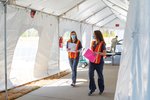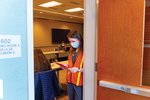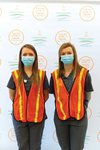


Allison Lipscomb is wearing her Carolina blues for the third time.
She earned an undergraduate degree in music from UNC in 1999 and later returned to get a master’s degree in Public Health. After that, she got involved with farmworker health outreach in Boone and eventually landed a job doing similar work for the state.
“When I was doing outreach with farmworkers, I saw what nurses could do in the field was a lot more than what I could do,” Lipscomb said. “So there were some public health nurses that really inspired me.”
Now the returning Tar Heel says she’s enjoying the challenge of the Accelerated Bachelor of Science Nursing program, an 18-month long curriculum intended for people with previous degrees coming back to school to study nursing.
That journey has Lipscomb and several other UNC students working with the Chatham Council on Aging — a nonprofit that focuses on providing aid and resources to people over the age of 60. Those students are being tasked with helping the organization address the public health needs that Chatham’s older residents face.
Lipscomb is one of nine students working with the COA this semester. Julie Jacobson Vann leads the class that places nursing students with the organization and explains that her students are completing what’s called a clinical practicum — an immersive, supervised learning opportunity where students can see how professionals actually perform in the field.
Vann said most clinicals take place in something like a hospital setting, but since the class she teaches focuses on public health nursing in community settings, students are matched with an organization and they work on health promotion, disease and injury prevention initiatives.
“We instead focus on population health,” she said. “We look at a population like the older adults in Chatham County. The students do a population assessment by looking at different sources of information by identifying what the health needs are of the population and then work on projects, or interventions, to help deal with those things on a relatively small scale.”
This semester’s group of students hasn’t been immune to the effects of the pandemic either; it’s forced what is usually very hands on, in-person based learning to go mostly virtual. Being able to interface with adults at one of the COA’s centers in Chatham County has been replaced with video meetings and phone calls trying to make sure good information is getting to people that could need it most.
Vann explained one goal of working in public health is developing effective prevention programs, which she broke down into three parts: The first is primary prevention, which aims to prevent problems from occurring to begin with. (Think of switching to a healthier diet or keeping up to date on your vaccinations.) The next phase, secondary prevention, is the label making phase of the preventative public health.
“(It’s) identifying problems early so that they’re more treatable, and that’s things like screenings,” Vann said.
And finally, tertiary prevention aims to prevent problems or complications from getting worse, ideally making people less likely to end up in hospitals or an emergency room — according to Vann. She likened it to someone with diabetes taking an instructional class on how to better manage their disease.
This year, students are creating presentations for the Virtual Health & Wellness Expo that’s set to take place throughout March. Along with the UNC School of Nursing and Chatham Health Alliance, the COA is having students host presentations every Tuesday morning on subjects ranging from the assumptions and myths around the COVID-19, getting regular health screenings and home safety tips.
Vann added the COA also helps students get an idea of how to plan care outside of medical offices.
“I think it’s just totally a unique experience for them because they get to see some of the challenges that people have once they leave the hospital,” she said. “That’s pretty eye opening for them. When they do get out in the field, they get a chance to see what people really deal with outside the hospital, so even if they end up working as nurses in the hospital, they may have a better understanding of challenging it can be for people to take care of themselves at home. Whether or not they have access to healthy food, or access to safe places to be active.”
Lipscomb said it’s been an adjustment as the university restructures classes to operate in a pandemic. She says there have been some benefits, like being able to stay home with her daughter and accommodate her husband’s work schedule. But she adds it’s been odd not having some of the face-to-face learning she was expecting.
“I think one of the more challenging things has been not having our clinical experiences earlier in the program,” she said. “Last summer we didn’t get to practice with live patients; everything was remote. And I think the university program is really doing it’s best to figure out solutions and to get nurses through and get us the training that we need. I think we will catch up, it’s just been a different start.”
For her intervention project, Lipscomb is working with members of the Chatham County Public Health Department to vaccinate communities of color, specifically older members of those communities. She said those efforts includes everything from making phone calls to mailing informational postcards that dispel myths about the vaccine and provide information on how to get vaccinated.
Lipscomb said her intervention aims to break down hesitations in communities that have a history of being exploited and left out of the medical system. She hopes that more people in communities of color will get vaccinated if they can see people like themselves signing up for a shot in the arm.
“We’ve heard that the older populations have been less hesitant to get the vaccine because of that immediate return on investment in the sense that their health is most vulnerable,” she said. “I think that the barriers that older people have, transportation wise and isolation, getting enrolled on the internet, there’s just more barriers for that population as well.”
Perhaps the biggest barrier for both the nursing students and the COA is access to real time human interaction. Liz Lahti, who manages the Eastern Chatham Senior Center, said having a level of warm contact was a cornerstone for the students as they performed their clinical work, something that’s proving hard to replace.
There have been efforts to set up driveway visits, at a safe distance, where students and seniors can get some social interaction and possibly do a health assessment. But she said she could see why some older adults would be hesitant to pick up the phone when an unfamiliar number from Chapel Hill pops up.
“When it was on our turf, we were there, we could see the interaction,” Lahti said. “I think some of the seniors are a little bit more leary about answering a phone call they don’t know. We’ve done a lot of scam training, so I think they’re a little bit leary about a total stranger calling them up and wanting to come by and see them.”
Lahti did mention the COVID-19 pandemic has taught the COA a few new tricks. Some of the nursing students are working on teaching older adults how to effectively use electronic devices to access things like health records, make appointments or simply connect with people. That’s something she imagines could be a serious boon to isolated seniors and potentially keep them engaged in the future.
The backdrop to all of us is that Chatham County, like the rest of the country, has a growing senior population. With people 60 and older now making up a third of the county’s population, Lahti is hopeful that means good things for the COA. She says more seniors means more potential donors and volunteers.
“I’m actually looking forward to it,” she said. “I don’t think we’re going to have to necessarily (do more work), they might be healthier, they might be younger, they might have a different frame of thinking. I welcome them, because it’s not going to be that much taxing. I think they’re actually going to add to our programs and to our center.”
Lipscomb said she’ll be graduating the program glad she got placed in a county that’s working to address it’s aging population and with an organization that focuses on keeping older people well resourced.
“I think the COA specifically really addresses what is needed in the home and in the communities,” Lipscomb said. “The COA plays a really important role in addressing other social needs. ... I feel like they really help serve the needs of aging populations when they’re not in the healthcare system and help prevent them from going into the healthcare system.”